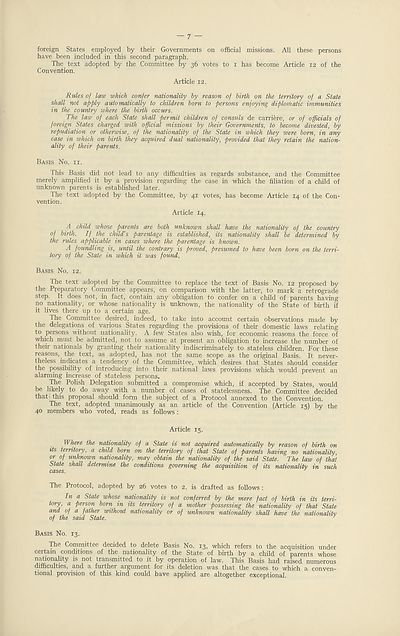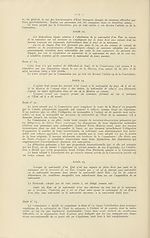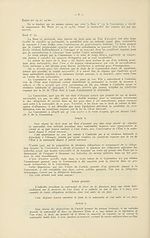Download files
Complete book:
Individual page:
Thumbnail gallery: Grid view | List view

— 7 ~
foreign States employed by their Governments on official missions. All these persons
have been included in this second paragraph.
The. text adopted by the Committee by 36 votes to 1 has become Article 12 of the
Convention.
Article 12.
Rules of law which confer nationality by reason of birth on the territory of a State
shall not apply automatically to children born to persons enjoying diplomatic immunities
in the country where the birth occurs.
The law of each State shall permit children of consuls de carriere, or of officials of
foreign States charged with official missions by their Governments, to become divested, by
repudiation or otherwise, of the nationality of the State in which they were born, in any
case in which on birth they acquired dual nationality, provided that they retain the nation¬
ality of their parents.
Basis No. ii.
I his Basis did not lead to any difficulties as regards substance, and the Committee
merely amplified it by a provision regarding the case in which the filiation of a child of
unknown parents is established later.
Ihe text adopted by the Committee, by 41 votes, has become Article 14 of the Con¬
vention.
Article 14.
A child whose parents are both unknown shall have the nationality of the country
of birth. If the child’s parentage is established, its nationality shall be determined by
the rules applicable in cases where the parentage is known.
A foundling is, until the contrary is proved, presumed to have been born on the terri¬
tory of the State in which it was found.
Basis No. 12.
The text adopted by the Committee to replace the text of Basis No. 12 proposed by
the Preparatory Committee appears, on comparison with the latter, to mark a retrograde
step. It does not, in fact, contain any obligation to confer on a child of parents having
no nationality, or whose nationality is unknown, the nationality of the State of birth if
it lives there up to a certain age.
The Committee desired, indeed, to take into account certain observations made by
the delegations of various States regarding the provisions of their domestic laws relating
to persons without nationality. A few States also wish, for economic reasons the force of
which must be admitted, not to assume at present an obligation to increase the number of
their nationals by granting their nationality indiscriminately to stateless children. For these
reasons, the text, as adopted, has not the same scope as the original Basis. It never¬
theless indicates a tendency of the Committee, which desires that States should consider
the possibility of introducing into their national laws provisions which would prevent an
alarming increase of stateless persons.
The Polish Delegation submitted a compromise which, if accepted by States, would
be likely to do away with a number of cases of statelessness. The Committee decided
that’this proposal should form the subject of a Protocol annexed to the Convention.
The text, adopted unanimously as an article of the Convention (Article 15) by the
40 members who voted, reads as follows :
Article 15.
Where the nationality of a State is not acquired automatically by reason of birth on
its territory, a child born on the territory of that State of parents having no nationality,
or of unknown nationality, may obtain the nationality of the said State. The law of that
State shall determine the conditions governing the acquisition of its nationality in such
cases.
The Protocol, adopted by 26 votes to 2. is drafted as follows :
In a State whose nationality is not conferred by the mere fact of birth in its terri¬
tory a person born in its territory of a mother possessing the nationality of that State
and of a father without nationality or of unknown nationality shall have the nationality
of the said State.
Basis No. 13.
The Committee decided to delete Basis No. 13, which refers to the acquisition under
certain conditions of the nationality of the State of birth by a child of parents whose
nationality is not transmitted to it by operation of law. This Basis had raised numerous
difficulties, and a further argument for its deletion was that the cases to which a conven¬
tional provision of this kind could have applied are altogether exceptional.
foreign States employed by their Governments on official missions. All these persons
have been included in this second paragraph.
The. text adopted by the Committee by 36 votes to 1 has become Article 12 of the
Convention.
Article 12.
Rules of law which confer nationality by reason of birth on the territory of a State
shall not apply automatically to children born to persons enjoying diplomatic immunities
in the country where the birth occurs.
The law of each State shall permit children of consuls de carriere, or of officials of
foreign States charged with official missions by their Governments, to become divested, by
repudiation or otherwise, of the nationality of the State in which they were born, in any
case in which on birth they acquired dual nationality, provided that they retain the nation¬
ality of their parents.
Basis No. ii.
I his Basis did not lead to any difficulties as regards substance, and the Committee
merely amplified it by a provision regarding the case in which the filiation of a child of
unknown parents is established later.
Ihe text adopted by the Committee, by 41 votes, has become Article 14 of the Con¬
vention.
Article 14.
A child whose parents are both unknown shall have the nationality of the country
of birth. If the child’s parentage is established, its nationality shall be determined by
the rules applicable in cases where the parentage is known.
A foundling is, until the contrary is proved, presumed to have been born on the terri¬
tory of the State in which it was found.
Basis No. 12.
The text adopted by the Committee to replace the text of Basis No. 12 proposed by
the Preparatory Committee appears, on comparison with the latter, to mark a retrograde
step. It does not, in fact, contain any obligation to confer on a child of parents having
no nationality, or whose nationality is unknown, the nationality of the State of birth if
it lives there up to a certain age.
The Committee desired, indeed, to take into account certain observations made by
the delegations of various States regarding the provisions of their domestic laws relating
to persons without nationality. A few States also wish, for economic reasons the force of
which must be admitted, not to assume at present an obligation to increase the number of
their nationals by granting their nationality indiscriminately to stateless children. For these
reasons, the text, as adopted, has not the same scope as the original Basis. It never¬
theless indicates a tendency of the Committee, which desires that States should consider
the possibility of introducing into their national laws provisions which would prevent an
alarming increase of stateless persons.
The Polish Delegation submitted a compromise which, if accepted by States, would
be likely to do away with a number of cases of statelessness. The Committee decided
that’this proposal should form the subject of a Protocol annexed to the Convention.
The text, adopted unanimously as an article of the Convention (Article 15) by the
40 members who voted, reads as follows :
Article 15.
Where the nationality of a State is not acquired automatically by reason of birth on
its territory, a child born on the territory of that State of parents having no nationality,
or of unknown nationality, may obtain the nationality of the said State. The law of that
State shall determine the conditions governing the acquisition of its nationality in such
cases.
The Protocol, adopted by 26 votes to 2. is drafted as follows :
In a State whose nationality is not conferred by the mere fact of birth in its terri¬
tory a person born in its territory of a mother possessing the nationality of that State
and of a father without nationality or of unknown nationality shall have the nationality
of the said State.
Basis No. 13.
The Committee decided to delete Basis No. 13, which refers to the acquisition under
certain conditions of the nationality of the State of birth by a child of parents whose
nationality is not transmitted to it by operation of law. This Basis had raised numerous
difficulties, and a further argument for its deletion was that the cases to which a conven¬
tional provision of this kind could have applied are altogether exceptional.
Set display mode to:
![]() Universal Viewer |
Universal Viewer | ![]() Mirador |
Large image | Transcription
Mirador |
Large image | Transcription
Images and transcriptions on this page, including medium image downloads, may be used under the Creative Commons Attribution 4.0 International Licence unless otherwise stated. ![]()
| League of Nations > Legal > Rapport de la Première commission (Nationalité) > (13) |
|---|
| Permanent URL | https://digital.nls.uk/191514831 |
|---|
| Shelfmark | LN.V |
|---|
| Description | Over 1,200 documents from the non-political organs of the League of Nations that dealt with health, disarmament, economic and financial matters for the duration of the League (1919-1945). Also online are statistical bulletins, essential facts, and an overview of the League by the first Secretary General, Sir Eric Drummond. These items are part of the Official Publications collection at the National Library of Scotland. |
|---|---|
| Additional NLS resources: |
|

